C3: Connecting Coaches Cognition
A Podcast for the busy coach
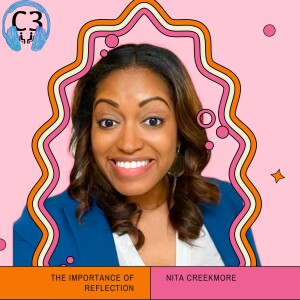
Wednesday May 03, 2023
Wednesday May 03, 2023
Nita Creekmore is an Instructional Coach who lives just outside Atlanta, GA. In the 19 years, she has been in education, she truly believes that in all aspects of the field, relationships must always come first. She has obtained a Bachelor’s in English, Master’s in Elementary Education, and Educational Specialist in Supervision & Leadership. She currently works for Bright Morning Consulting as a Presenter. Nita is also an Instructional Coach Consultant through her business, Love Teach Bless, LLC.
Nita is married to Michael Creekmore, Jr., and has four children. In her free time, she loves spending time with her family and friends, attending her kids' activities, practicing yoga, and relaxing with a good book.
Episode Notes:
-Coaching is embedded professional development that is transformational. Coaching is supportive, it is being in community with one another, but also learning as a coach alongside the coachee.
-Reflection starts with yourself. The coach needs to self-reflect and build a relationship to build space for vulnerability in order to do deep reflection. The things you ask your coachees to do, you should do every day as well. Use journaling and coaching conversations with yourself to do that reflection work.
-Reflection with educators can be stretched with the conversation with a coach. There needs to be a lot of trust and relationships built to make this successful. What emotions are coming up for you? What did you feel like in the observation? What constitutes joy for you
in teaching?
- The 5 Whys - use these to deepen the reflection.
-If you do not have a coach, you can use your team to reflect. You can even dig into the 5 whys with yourself. Try to elicit the reflection. Offer yourself grace and self-compassion. Try celebratory reflection!
-Closeout conversations, having the space to reflect on their big wins or their goals for moving forward. These are so important to tie up the year and think through the areas that they felt that they were winning and trying to grow more in. Coaches can also do this for themselves on paper in order to reflect for themselves to become even more transformational as a coach.
-Inspired Educators, Inspire Educators
-When you think that you are having a teacher that you cannot reach, always go back to yourself and look at how you are showing up. And also look at how you started that relationship. What could have been done differently? How can it be restored, if needed?
Connect with Nita:
Instagram: LoveTeachBless
https://love-teach-bless.com/
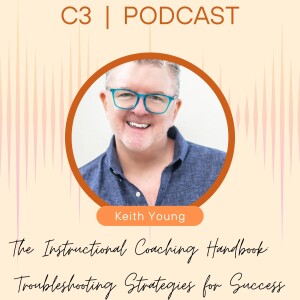
Wednesday Mar 29, 2023
Wednesday Mar 29, 2023
Keith Young is an education coach, trainer, and writer. Keith was raised in the foothills of the
Appalachian Mountains of northern Alabama. After a short stint at seminary, he pivoted to
teaching secondary students for the U.S. government in Germany. In his first years of teaching,
he developed a knack for leading and training colleagues. Eventually, Keith shifted full-time to
training teachers and leading school improvement efforts at the school district level. Later, he
became a principal, leading school turnaround work and regularly increasing student outcomes
by double digits in Colorado, Puerto Rico, and Arizona. Along the way, Keith picked up a
multiplicity of advanced education degrees. Nowadays, Keith lives on the coast of South
Carolina and trains and coaches administrators, school leadership teams, and teacher coaches.
As a coach, he’s known for “telling it like it is” and using a blended coaching model. The schools
Keith coaches across the United States and internationally produce significant increases in
student outcomes academically and affectively.
Episode Notes:
-Keith has a varied background and is in about 1,000 classrooms a year coaching educators, modeling coaching with coaches, as well as modeling coaching for administrators and doing model lessons with students.
-What is a coach? - A coach is a professional who prompts a teacher, trains a teacher, or instructs a teacher. Think of your piano teacher, your baseball, or gymnastic coach. Those effective practices inform our coaching.
-The Instructional Coaching Handbook: A one stop shop to look at those trouble spots in coaching. Give ideas, try, and see what works! It is a place to grab ideas around anything troubling you in coaching.
-Knight, Aguilar, and Marzano were pulled from and influenced these amazing authors.
-Coaching is about empowering educators, this is for your whole life. This is for the whole generation of students you teach.
-Dot and circle analogy- focus on what you can control.
-Teach teachers to curate- curate a strategy to get past this hardest to teach ideas, concepts, and skills.
-Coaching is a professional conversation with a goal and don’t forget to be kind.
-Brainstorming is a super power.
Follow Keith:
Twitter: @a_keithyoung
Website: Akycinsulting.com
LinkedIn & Facebook: akeithyoung
Instagram: akyconsulting
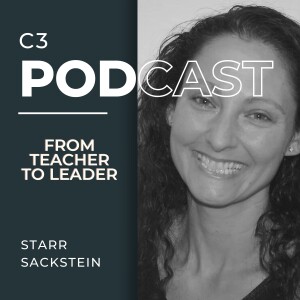
Thursday Mar 02, 2023
Thursday Mar 02, 2023
Starr Sackstein has been an educator for 20 years and is currently a full-time educational consultant, instructional coach, and speaker. Starr received National Board Certification in 2012 and was recognized as an outstanding educator that year by Education Update. Association and served as the New York State Director for JEA. She was named an ASCD "Emerging Leader" class of 2016 and had the opportunity to give a TEDx Talk called "A Recovering Perfectionist's Journey to Give Up Grades" and has spoken on The Red Dot Cafe in affiliation with TEDx San Antonio about grading practices.
She is the author of many educational books She also blogs on Education Week Teacher at "Work in Progress" and has contributed to several other publications.
Episode Notes:
-When you are deciding whether to take on a leadership role, make a pros and cons list. What are you most afraid of losing? What are the things you love? Evaluate what is important to you.
-If you are ready to leap to leadership, put on your best face when interviewing. Just as they are interviewing you, you are interviewing them to see if it is a good fit. Try to ask a lot of strategic questions when you interview. Just because you interviewed, it does not mean you have to accept a position. Are you philosophically aligned with the role you are moving into? Find a home that is a good fit, do not worry about damaging your future by making a move in your career.
-You will likely hit a state of overwhelm when you move to a leadership role. Be ready with an open mind and utilize others as your teachers. Be mindful of what you say and how you say it. Build relationships and listen first.
-You know you are making an impact when the early adopters are taking you up on your offers to coach or collaborate.
-You can still be a leader within the classroom: mentor, join a committee, be a coach, state run or regional organizations, Find your own way to lead at your site!
-Be mindful of how and when you share information as a coach. Apologize when you make a mistake, be clear and own your actions.
-Changing the world one mind at a time!
Connect with Starr:
Twitter: @MsSackstein
Website: https://www.mssackstein.com/
Masteryportfolio.com
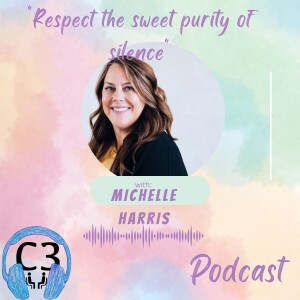
Saturday Feb 04, 2023
Saturday Feb 04, 2023
Michelle Harris, Senior Consultant at Instructional Coaching Group (ICG)
has spent almost three decades as an educator, starting as a Special
Education Paraprofessional in Salt Lake City, Utah before completing her
Masters in Teaching at Pacific University and teaching middle school in El
Cajon, CA and Beaverton, OR. She served as an instructional coach for
teachers and students in a comprehensive 6-8 middle school as well as a
K-8 school. She then became an administrator in a 6-12 IB school, and
two comprehensive 6-8 middle schools.
Michelle is a seasoned staff developer, certified in multiple Training of the
Trainer programs such as Sheltered Instruction, Data-driven Decision
Making, Effective Teaching Strategies, and Non-Fiction Writing. She has
worked for Jim Knight since 2012, after participating in a Coaching Study
with Jim through the University of Kansas in 2009-2011, and has facilitated
workshops, coached, and keynoted across the United States and Canada,
as well as in multiple European countries, Asia, and Africa.
Recently, Michelle partnered with Jim Knight, Sharon Thomas, and Ann
Hoffman to author The Instructional Playbook: The Missing Link for
Translating Research Into Practice and Evaluating Instructional Coaching:
People, Programs, and Partnership.
Through ICG, Michelle facilitates workshops, coaches, and provides
consulting for coaching programs around the world. She lives in Portland,
OR with her husband, two sons, and three cats, and one small corgi.
Episode Notes:
-Michelle has been in education for almost 30 years and was trained with Jim Knight in instructional coaching.
-A coach is a partner who opens up a physiologically safe space with time for thinking, reflecting, problem solving and ultimately turning all that talk into action in the classroom, promoting change.
-Sometimes in coaching there is a lack of role clarity. If you do not have clarity on what you do and how you do it within the system, it is hard to do a quality job in coaching.
-Teacher evaluations do not fit coaching.
-Coaches need an evaluation system that is 100 percent aligned to the outcomes we are seeking. It is critical to have role clarity as an instructional coach.
-We speak about surface coaching versus deep coaching. Both are vital to the role of coaching. Surface coaching helps to build rapport and enhance your street credit. Deep coaching is the impact cycle and doing coaching cycles with educators around specific goals.
-Collect data on who is coming to you and what are they asking for, what patterns are we noticing, this helps us impact PD in our buildings or systems.
-Collect data on the impact cycle: where did you start? What was your goal? What strategies did you utilize? What was your end goal? How long did it take kids to meet that goal? What tweaks did you make along the way?
-Collect data to show your coaching impact. Show the difference you are making. Collect that evidence of difference making.
-Learning Architecture with support for the coaches is vital.
-Coaching is not fixing people. We need an asset model. There should not be a stigma in education for using a coach. Think about sports: everyone uses a coach.
-The practice of video recording your coaching can be such a remarkable reflective practice for growth.
-Respect the sweet purity of silence.
Connect with Michelle:
LinkedIn: MichelleRodgersHarris
Twitter: @harrismr1
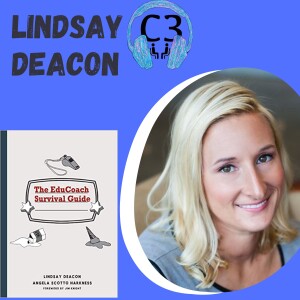
Wednesday Jan 04, 2023
Wednesday Jan 04, 2023
Episode Notes:
-Lindsay comes from a family of educators. Lindsay’s first coach was trained in Jim Knight’s Instructional Coaching and she was asked to replace her years later. She had the opportunity to go to Kansas to learn from the Instructional Coaching Group. She found her passion for coaching in this time.
-Lindsay is very connected with Jim Knight's work. She also has bounced back and forth from coaching to the classroom and back again. She purposefully chose to go back to the classroom in 2020. Her definition of a coach has evolved through this time.
-A coach is a collaborative partner that will help to set and meet goals. They will help to enhance teaching practices as well as student achievement.
-The EduCoach Survival Guide
-Eisenhower Matrix Strategy - Four quadrants, prioritize everything you have to do by urgent, not urgent, important, not important. Sticky notes for each item and put them up based on each component. WIth less priority items, think about how you can eliminate it or delegate it. Lindsay tried this tactic on a white board and made it visual for herself, students, and other staff members.
-As coaches it seems like there are so many urgent or busy work requests, so we need to align our work with what is going to have a large impact.
-Be clear about your role with the people you coach. Do you set coaching agreements? She highly recommends setting these in order to avoid falling into the friend zone with a coachee.
-Find your network! In order to improve our practice we need our peers. Visualize, journal, and sketch what you want from your learning network. #educoach Be creative and take the lead.
-The most important thing coaches can do is be listeners, be listeners to the story of what teachers are telling.
-Good coaches listen and funnel the conversation with good questions. By the end, the teacher feels that they got some of the most pressing business out, but also found a plan as to what to do next.
-Coach retention- What do you really love about coaching? What do you hate? Think about journaling or sketching this out. How can you adjust things to make it more about what you love?
-Smile File - portfolio of things that bring you back to your coaching happy moments.
-Who are we to tell anyone what they can or can’t do?
Connect with Lindsay:
https://educoachsurvivalguide.com/
The EduCoach Survival Guide on Instagram or Twitter
Twitter: @TheRealLindsay2
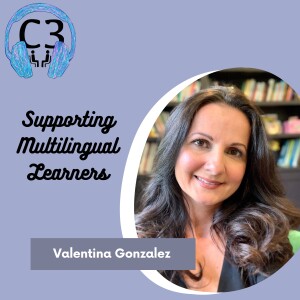
Wednesday Nov 30, 2022
Wednesday Nov 30, 2022
Valentina Gonzalez, the co-author of Reading & Writing with English Learners: A Framework for K-5, is a longtime educator who has served 20+ years in education in her own classroom, as a district facilitator for English learners, a professional development specialist for ELs, and as a consultant. Her work’s primary focus has been on literacy, culture, and language. Valentina delivers professional development and works with teachers of multilingual to support language acquisition and literacy instruction.
Episode Notes:
-Background as an elementary classroom teacher as well as ESL educator. She also supported ESL Teachers at their campuses as well as she is a professional development specialist.
-Took a long time to learn what was best for the multilingual learners in the classroom.
-Her book is Reading & Writing with English Learners: A Framework for K-5: A Framework for K-5
-It is essential to write your core beliefs as an educator no matter what content or population that you serve. Doing this as a team is powerful. Utilize those in the daily planning and align everything to those core beliefs.
- Literacy in any language holds value and can be leveraged to support learning and acquiring English.
-Student choice in reading and writing is essential. When we have a choice we are more motivated.
-We can be most effective when we start from the heart and build from there.Center ourselves around students and what they need first. The only way to avoid assumptions is by being super curious.
-We need to talk less and listen more to our students and their families.
-Keep learning as much as you can about the kids, and center everything we do around those students. That is the secret sauce.
-Be a listener, get them talking!
-Mini-lessons are super effective with multilingual learners. It can increase the comprehensibility of the lesson by breaking it down into smaller chunks. We still need to have checkpoints to stop and check for understanding with our students.
- Picture Word Inductive Model - learning content while also embedding speaking, listening, reading, and writing.
-Stay tied to the curriculum but infuse language into the lesson as well. See and hear at the same time.
-Excellence for multilingual learners does not happen by accident; we design it! We have to!
-Focus on students; focus on the child! What are the kids doing?
Connect with Valentina:
Twitter: @ValentinaESL
Website: www.ValentinaESL.com
www.ReadingwritingELs.com
New children's book coming soon!
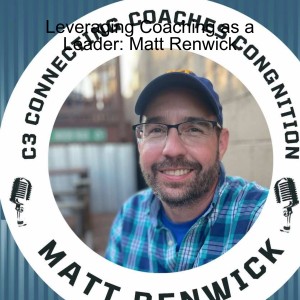
Wednesday Nov 02, 2022
Wednesday Nov 02, 2022
Matt Renwick is an elementary principal in Mineral Point, Wisconsin. Previously he served as an assistant principal, athletic director, coach, and classroom teacher in Wisconsin Rapids, Wisconsin. Matt was recognized as a Friend of Literacy by the Wisconsin State Reading Association in 2020 and received the Kohl Leadership Award in 2021. His books include 5 Myths About Classroom Technology: How do we integrate digital tools to truly enhance learning? (ASCD, 2016), Digital Portfolios in the Classroom: Showcasing and Assessing Student Work (ASCD, 2017), and Leading Like a C.O.A.C.H.: 5 Strategies for Supporting Teaching and Learning (Corwin, 2022). You can find Matt on Twitter @ReadbyExample.
-Matt has always enjoyed coaching children and athletics. He found his way into many roles in education and fostered a strong interest in literacy as well as engagement with readers and writers.
-What have I learned around literacy and leadership? This is where this book was born, Leading Like a C.O.A.C.H.: 5 Strategies for Supporting Teaching and Learning.
-Educational Improvement- Matt used to have more of a linear approach. Coming into administration, he thought he could present an idea, then teachers would adopt them, and schools would improve. He realized everyone is coming from a slightly different angle as to what is best practice. It is way more complex than this. He has learned he has to engage with every teacher and build deep trust. Therefore, knowing where each teacher is and being able to work from there is the best starting point for improvement.
-Instructional walks are powerful.We need to be leading as a learner, in a more reciprocal and mutually beneficial relationship with faculty, which has better results with everyone's learning, including his own.
-Leading like a C.O.A.C.H.-
Matt likes to: Pay attention to myself and others. Be mindful of how he is feeling. Listen first and hear where they are coming from. Use paraphrasing.
Shift from giving advice and needing to know everything to asking more questions, listening deeply, and being the listener first. Allow others to solve their problems when possible.
C-Creating Confidence through Trust
O-Organizing Around a Priority
A- Affirming Promising Practices - noticing and naming strengths already present
C- Communicating Feedback
H- Help Teachers Become Leaders and Learners - Support self directness
-Building confidence and trust is always at the forefront. When we are clear on what we are working on in order to press forward together more progression is made.
-Make sure we honor the difficulties and loneliness of teaching. Be empathetic and also provide perspective.
-Instructional Walks - Take a photo and put it in a brief email to follow up with that educator. It is his opportunity to build context. Write down what you see and hear as a narrative. Give that feedback from an affirming stance.
- Collects the narrative and notes in a digital drive in order to show educators the wins they are having with their kids. He documents how he is in their corner, and also is able to build from moving forward. We need to recognize the good first, and then hear the feedback. We help them to create an artifact of what they do everyday and a case as to how they are effective. We share the wins they are getting with kids. Teachers also collect artifacts for themselves.
-If you are recognized first you are much more receptive to feedback.
-Get into classrooms and just start to document five or six words of what you noticed. Get to every classroom, then take the time to reflect on your own as an administrator, or with a coach around trends or patterns we are seeing. Then communicate these to staff. From there, we can design professional learning around those goals. This is where collective commitments can come into play and have tremendous power.
-Leaders need to know literacy - Regie Routman
-Pausing is the superpower. I have never gotten in trouble or made a mistake when I did not say something. It has always been when I said something and wished I could have taken it back.
Connect with Matt Renwick:
-Twitter: @readbyexample
-Newsletter: Readbyexample.substack.com
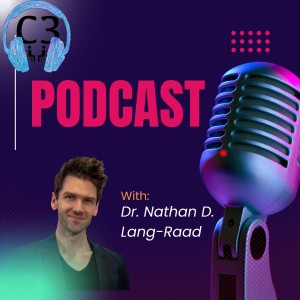
Thursday Oct 06, 2022
Thursday Oct 06, 2022
Dr. Nathan D. Lang-Raad is an educator, speaker, and author. He is the Vice President of Strategy at Savvas Learning. Throughout his career, he has served as a teacher, elementary school administrator, high school administrator, and university adjunct professor. He was the Director of Elementary Curriculum and Instruction for Metropolitan Nashville Public Schools, as well as education supervisor at NASA’s Johnson Space Center. He was also the Chief Education Officer at WeVideo. He serves as the US State Ambassador for the Climate Action Project, a collaboration between the United Nations, World Wildlife Fund, NASA, and the Jane Goodall Institute, and an advisor for TAG (Take Action Global).
Nathan is the author of Everyday Instructional Coaching, The New Art and Science of Teaching Mathematics co-authored with Dr. Robert Marzano, WeVideo Every Day, Mathematics Unit Planning in a PLC at Work, Instructional Coaching Connection, The Boundless Classroom (with James Witty), and The Teachers of Oz, co-authored with Herbie Raad.
Nathan received a bachelor of arts degree in general science-chemistry from Harding University in Searcy, Arkansas, a master of education degree in administration and supervision from the University of Houston-Victoria, and a doctorate of education degree in learning organizations and strategic change from David Lipscomb University in Nashville, Tennessee.
He resides with his husband, Herbie Raad, in beautiful Maine.
To learn more about Nathan’s work, follow him on Twitter: @drlangraad
To book Nathan’s services for keynotes and workshops, contact him at drlangraad@gmail.com.
-Coaching is a partnership. A coach is a cheerleader and consummate listener who guides and helps to further teaching and instructional practices.
-Nathan first noticed the value of a coach’s role during his first year of teaching.
The experience of trust, and non-evaluative support, helped guide him though that year, paving the way forward as he grew as an educator.
-To give meaningful feedback while staying non evaluative, there has to be a deep level of trust. The relationship has to be organic and build over time. The goals and purpose need to be clearly articulated. Establishing that coaches are working with you not in some sort of hierarchical position.
-Building empathy comes from a place of honesty and vulnerability. The coach needs to show they do not have all the answers. Every coach is still a learner, being honest about that can help with empathy building, in large ways. There is a power in numbers, and helping teachers to not feel like they are in it alone.
-Coaches can support effective team meetings by making sure they are extremely purposeful and well structured. Have meetings that have defined autonomy to accomplish agreed upon outcomes is key. There must be clear norms. Don’t meet unless there is a clear agenda and purpose for that time together.
-There is this idea of success that it is the teacher or coach who never stop working. They are go, go, go! That level of productivity cannot be sustained, nor should it be. Our well being should always be the priority, meaning taking care of ourselves at home. You have to feed your soul. Then you can come back and be more productive and creative when you return to work.
-”Be loyal to yourself” - Be yourself, and out of digging into yourself, you will grow and thrive in that process.
-Asking questions - “I have some ideas about that, but I want to hear your thoughts first.”
Connect with Nathan:
Social Media: @drlangraad
Email:drlangraad@gmail.com
Books: Instructional Coaching Connection
New Book out next spring: Never Stop Asking
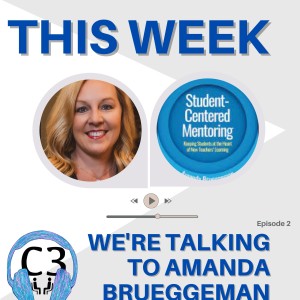
Wednesday Aug 31, 2022
Wednesday Aug 31, 2022
Episode Notes:
-Student Centered Mentoring Book: Keeping Students at the Heart of New Teachers’ Learning
-4 Core Beliefs for Success: Empower others to grow, Learning is Process and so is Teaching, Relying on others, and Setting Goals as well as keep trying.
-Student Centered Mentoring - a collaborative approach for mentors and mentees that focuses heavily on the impact of students’ learning with layers of support.
-More focus on what students are doing as opposed to the more traditional watching of what the teacher is doing. It is less evaluative. When doing observations keep the focus on the students.
-Partnership is key, we can’t do our work alone.
-Utilize Directional supports- to help narrow down the support for the new teachers.
-Being a model of listening, another layer of support.
-Use the lens of the mentor for more tips.
-Natalie- “Question until you know, instead of faking it until you make it!”
-Tina - As a mentor she jumped in and did a coaching cycle in order to stretch her own learning. Do the mentor cycle and be vulnerable to show the learner side.
-Strength Based Feedback- thinking about how you implement it has to do with your relationship. Beware of how much clarifying you are doing. Can you celebrate? Collect good language and sentence stems to utilize in the future.
-In order to retain teachers we need to have conversations with each other around, how can we help all students learn? Do we still hold those same expectations for all students? We need teacher efficacy but also collective efficacy. These should work in tandem together.
-With all of these things in place it helps build our belief that we can make that impact on our kids.
-To keep educators in the profession we can try out the directional supports outlined within the book. Providing many different options of support for our educators. Don’t assume, and ask the good questions.
-Keep questioning as mentors, and try to be specific with those questions of support. Try to uncover the beliefs and continually check in with your mentees.
-”Empower others to make and impact”
-Ask questions.
Connect with Amanda:
Website: www.AmandaBrueggeman.com
Twitter: @ACBrueggeman
YouTube Videos - more coming soon

Wednesday Aug 03, 2022
Wednesday Aug 03, 2022
-The PD Book: 7 Habits that Transform Professional Development by Elena Aguilar and Lori Cohen The PD Book
-This book grew organically out of leading PD and reflecting on leading PD. It felt like the next thing to work on and bring to the front.
-Imagining PD like a party - wanting PD to not be draining, but instead enlivening, exciting, and nourishing. What if PD could feel more like a party or a gathering or experience when you connect with people? Where are you energized?
-There is so much in this book and her work that is research based. When we look at conditions that are essential for people to learn, it is psychological safety. A place where you can ask questions, or discuss, elaborate, and acknowledge things.
-7 Habits that transform Professional Development
-Cultivate psychological safety. - How do people interact?
-Accept it or fight it.
-Use the strategies and systems from within the classroom and that honor learners as students or adults.
-Storytelling: An endless resource for connection and bringing people together. I often guide others in identifying their experiences in their lives to be able to relate to and tell.
-A story to share with listeners: Facilitating a beginning of year retreat with conversations around equity. Elena felt, “I can't do this, I can't do this, I can't do this!” I was literally on the floor and at my low as a facilitator. In some ways it helps me to see my own growth and learning. To recognize the low points and to mine them for lessons, and wisdom is huge. We share these moments so others can hear I have been there. Your growth or learning is powerful.
-High points: when facilitating PD.
-Responsible cultivators of adult learning - 1. DeterminePurpose - why? 2. Engage Emotions 3. Navigate power 4. Anchor in adult learning 5. Design intentionally. 6. Attend for details 7. Facilitate adaptively
-Conditions necessary for people to learn and understand and strategize to facilitate the learning.
-Tell me more about what you are actually concerned about?
-#1 question: How do you deal with resistance? Only resistance if there is force in two ways. -Resistance is a mask for fear at times.
-We can make every conversation count towards a more just and equitable world!
-Disposition is authenticity and transparency: Sometimes people are most moved by me saying, “I want to stop and I am feeling nervous. Can we hit pause for a second? And figure out how we move forwards? If I can be brief and honest, people appreciate this.”
Connect with Elena:
Twitter: @brightmorningtm
Podcast: BrightMorningPodcast
Website: https://brightmorningteam.com/
Next Book Coming Soon - 2023
Art of Coaching 2.0 Book - 2023
Arise, How to Thrive as a BIPOC Educator
A Podcast for the busy coach